Korg microKORG XL
$310.99
The Korg microKORG XL is the perfect synthesizer for creating unique, rich and powerful sounds with ease.
Compare
Description
Korg microKORG XL Synthesizer: The Revolutionary Tool for Music Production
Music production has been revolutionized in the recent past, thanks to the advancements in technology. Composing music has never been easy, and music producers and composers have always had to rely on a combination of musical instruments to get their desired sound. However, music production has become more accessible, streamlined, and efficient with the advent of electronic tools such as synthesizers. One such synthesizer that has stood the test of time is the Korg microKORG XL Synthesizer.
Korg microKORG XL Synthesizer: The Basics
The Korg microKORG XL Synthesizer is a compact keyboard synthesizer that provides an extensive range of timbres and textures for music production. Its unique features include analog modeling, vocoder, and a host of other sound creation options that give musicians and producers the versatility they need to create high-quality tracks. The microKORG XL takes the acclaimed microKORG’s classic functionality and delivers a generous array of enhancements to ensure the sound-marketing potential is better than ever.
Design and Usability
The Korg microKORG XL Synthesizer follows the tradition of Korg’s compact designs combined with an elegant interface that provides users with easy access to editing sound parameters. It has a sturdy chassis that can withstand the rigors of frequent touring and studio usage. It is lightweight and doesn’t take up much space, making it portable and convenient for on-the-go music production.
Sound Quality
Korg microKORG XL Synthesizerallows users to create rich sonic textures with its unique sound engine that offers an impressive combination of 128-note polyphony and 16-voice synthesizers. Its sound quality is superb, making it an instrument that can produce some of the best-sounding music.
Features
The Korg microKORG XL Synthesizer has a host of features that make it a favorite to many musicians and producers. First, it has a range of classic essential sounds that are optimized for performance. Secondly, it has a 16 band vocoder that allows users to create stunning sounding vocals. The vocoder can produce robot voices, synthetic harmonies, and much more.
The Korg microKORG XL Synthesizer also comes with a potent arpeggiator, and the editing options in this device are extensive. Furthermore, users can store up to 256 sounds, combine two programs to create splits and layers, and its USB port is a handy addition for recording music and saving patches.
Conclusion
The Korg microKORG XL Synthesizer is an exceptional and versatile tool for music production. It is a platform that offers intricate sound creation, extensive editing capabilities, and excellent portability, making it the perfect instrument for those in the music production space. Its sound quality, sleek design, and the host of features it offers make it a must-have for any music producer, regardless of skill level. Korg microKORG XL Synthesizer offers users endless possibilities in sound design, and its ability to deliver quality sound is unmatched.
Korg microKORG XL properties
| Product name |
microKORG XL |
| Brand |
Korg |
| Type |
Keyboard Instruments |
| Keyboard Instrument |
Synthesizer |
| Rotary Controls |
Yes |
Frequently Asked Questions:
Can you troubleshoot and repair a Korg microKORG XL synthesizer with failed MIDI communication?
Certainly, I can help you troubleshoot and repair a Korg microKORG XL synthesizer with failed MIDI communication issues. Here are some steps to follow:
1. Check the connections: Make sure that the MIDI cable is securely connected to both the synthesizer and the device you are trying to communicate with. If you are using a USB-to-MIDI adapter, check if it's properly plugged in and configured correctly.
2. Check power supply: Ensure that your synthesizer has enough battery or is connected to an appropriate power source. A low battery can cause communication issues.
3. Software issues: If you are using a computer or another device to communicate with the microKORG XL, check if the software you are using is up-to-date and compatible with your synthesizer. Some software may not work well with certain models of synths.
4. Reset the synthesizer: Turn off the microKORG XL and remove any cables connected to it. Then, press and hold both the "Write" and "Preset Select" buttons for about 5 seconds while turning the power on. This should reset the synthesizer's settings and may fix communication issues.
5. Firmware update: Korg releases firmware updates from time to time that can improve MIDI communication and other aspects of the synthesizer. Check if there is an available update for your microKORG XL and follow the instructions provided by Korg to update it.
6. Hardware issues: If none of the above solutions work, there might be a hardware issue with your microKORG XL. In this case, you should contact Korg's customer support or take it to an authorized service center for repair.
How does the updated KASSEN filters and oscillator modes on the Korg microKORG XL enhance its synthesis capabilities compared to previous models?
The newly introduced KASSEN filters and oscillator modes on the Korg microKORG XL significantly elevate its synthesis capabilities. The KASSEN filters, which are based on the acclaimed MS20 filter algorithm, offer a unique low-pass resonance character that adds warmth and richness to the sounds. This makes it ideal for creating lush pads, gritty bass lines, and crisp leads. Moreover, the oscillator modes have been expanded to include a new mode that generates complex harmonics, resulting in intricate textures and unusual timbres. These improvements provide a wider palette of sonic possibilities, setting the microKORG XL apart from its predecessors and making it an even more versatile synthesizer for musicians and producers alike.
How can I program and utilize the advanced arpeggiator feature on the Korg microKORG XL synthesizer for creating complex rhythmic patterns?
To program and utilize the advanced arpeggiator feature on the Korg microKORG XL synthesizer for creating complex rhythmic patterns, follow these steps:
1. Press the ARP button located in the center of the panel to turn on the arpeggiator. The ARP LED will light up. Use the DATA ENTRY wheel or the CHORD/SCALE wheel to select the type of arpeggio you want to use. The DATA ENTRY wheel allows you to select individual notes, while the CHORD/SCALE wheel lets you choose from pre-set chords and scales. Adjust the ARP SHIFT knob to set the rhythmic pattern for your arpeggio. You can choose from up, down, random, and other patterns. Set the LATCH switch to "ON" to lock the arpeggiator in place. This will allow you to play other notes on top of the arpeggio without stopping it. Use the RATE knob to adjust the speed of the arpeggio. You can also use the Sync Out jack to sync the arpeggio with external devices or other Korg synthesizers. Experiment with different settings to create complex rhythmic patterns. Try using different chords and scales, as well as various rhythmic patterns and speeds. Use the microKORG XL's sequencer feature to record your arpeggiated patterns into a song or performance. This will allow you to play back your creations at any time. Remember to save your settings using the SYSTEM button, so you can easily recall them later. Finally, practice and experiment with your newfound arpeggio skills! The microKORG XL's advanced arpeggiator feature is a powerful tool for creating complex rhythms and patterns, so don't be afraid to explore its capabilities.
How does the Korg microKORG XL's enhanced filter section contribute to its reputation as a top-choice synthesizer for hip-hop, techno, and house music producers?
The Korg microKORG XL's enhanced filter section plays a significant role in its reputation as a preferred synthesizer for hip-hop, techno, and house music producers. The filter section is critical in shaping the sound of a synth lead or bass, determining how the sound reacts to different frequencies and resonance levels. The microKORG XL's filter section boasts a high-pass filter, low-pass filter, and band-pass filter, all with enhanced resolution, providing users with unparalleled control over their sounds. This level of detail enables producers to create unique and complex synth textures that are essential in these genres. In addition, the microKORG XL's filter section features a drive circuit that adds harmonic content to the signal, giving it warmth and depth, further contributing to its reputation as a top-choice synthesizer for hip-hop, techno, and house music producers. Overall, the enhanced filter section of the Korg microKORG XL is a crucial component in its popularity among these genres' producers, allowing them to craft their signature sounds with precision and detail.
Before you buy Korg microKORG XL
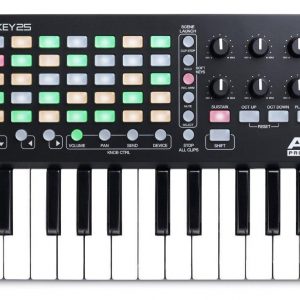 Akai APC Key 25
Akai APC Key 25 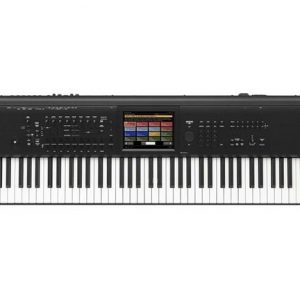 Korg Kronos-2 88
Korg Kronos-2 88 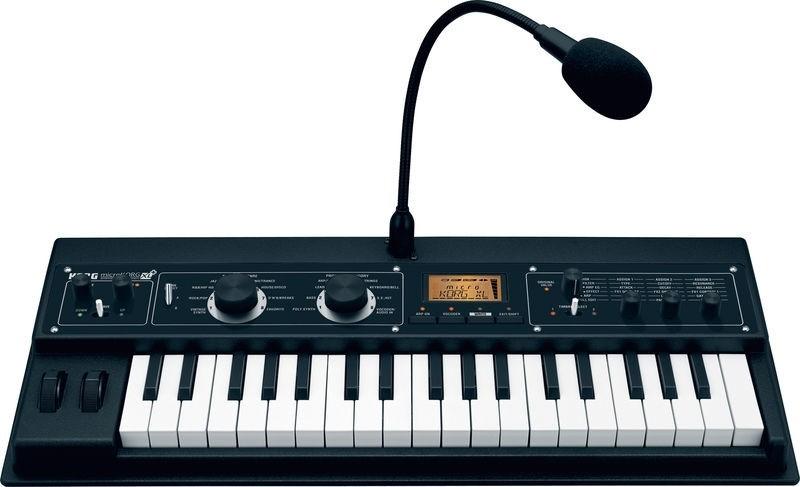



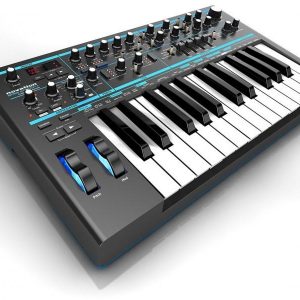
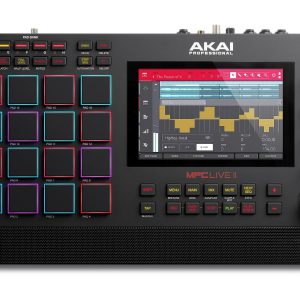
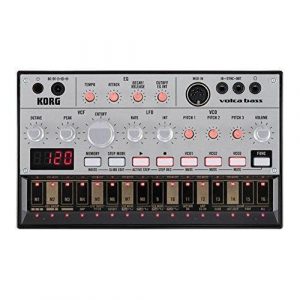
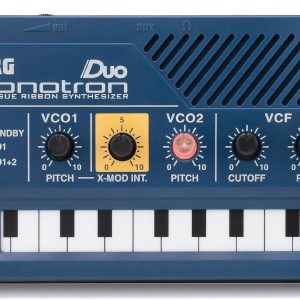
Hannibal Salazar –
The synthesizer sounds are in a class of their own, while the guitars, basses and strings are correct for a keyboard at this price (although we’re not fooling anyone with them – unless we’re doing something more synthesized by design).
The station’s strongest advantage is definitely the recording creation and editing tools. The potential of the equipment in this matter is huge, allowing you to create interesting compositions and improve them after recording without the need for a computer or other peripheral devices. Maybe the polyphony (only 80-voice) may be limited here, but so far I have had no problems with this limit.
Alivia Vasquez –
The review written by Hannibal Salazar for the Korg microKORG XL synthesizer seems to be highly favorable, particularly praising its unique synth sounds and the potential of its recording creation and editing tools. However, I must challenge some of his arguments and present a more melancholic perspective on this product.
Firstly, while it’s true that the synthesizer sounds are exceptional, one cannot ignore the fact that the microKORG XL is priced at a premium compared to other similar products in the market. As a result, the comparative quality of its guitars, basses, and strings must be weighed against this price point. While they may be satisfactory for the cost, it’s still hard to justify such high pricing when other synthesizers offer superior guitar and string sounds at lower rates.
Secondly, Salazar’s praise of the recording creation and editing tools seems a little too enthusiastic. Yes, the station’s capabilities in this regard are impressive, but the limitations of its 80-voice polyphony cannot be overlooked. In today’s music production industry, where layering multiple tracks is commonplace, the microKORG XL’s polyphony might not suffice for creating complex compositions. This limitation could pose a significant challenge for musicians who prefer to work with thicker arrangements that require more voices.
Furthermore, Salazar’s review fails to acknowledge the fact that technology is advancing at an alarming rate, and the microKORG XL may soon become obsolete. The product’s lack of MIDI compatibility with other devices also limits its versatility in a studio setup, which could be a significant drawback for musicians who prefer working on multiple platforms.
In conclusion, while Salazar’s review is undoubtedly persuasive, I would like to offer a more melancholic perspective on the microKORG XL synthesizer. Its unique synth sounds and recording capabilities are impressive, but its high price point and polyphony limitations make it less appealing than some of its competitors in the market. Furthermore, the lack of MIDI compatibility could pose significant challenges for musicians who prefer working across multiple platforms. Ultimately, while the microKORG XL is undoubtedly a formidable product, it’s essential to weigh its benefits and limitations before making a purchase decision.